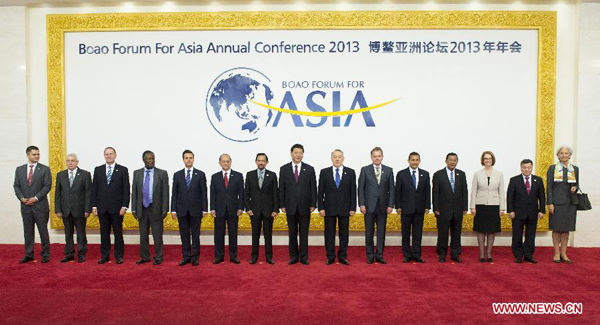Bridge-building in Boao
- By Tim Collard
 0 Comment(s)
0 Comment(s) Print
Print E-mail China.org.cn, April 8, 2013
E-mail China.org.cn, April 8, 2013
|
|
|
Chinese President Xi Jinping delivers a keynote speech at the opening ceremony of the Boao Forum for Asia (BFA) Annual Conference 2013 in Boao, south China's Hainan Province, April 7, 2013. [Xinhua] |
As usual, there was a heavy-duty line-up of powerful and influential figures at the recently concluded annual Boao Forum for Asia (BFA). The forum attracted seven presidents, including China's Xi Jinping, and three prime ministers, in addition to several economic and financial heavyweights, such as Christine Lagarde, the managing director of the International Monetary Fund (IMF), Bill Gates and George Soros.
There is, however, a contrast here with the last major economic forum attended by President Xi, the BRICS summit in South Africa in late March. The BFA has a regional focus, whereas the BRICS are a loose association of countries which have nothing much in common beyond their common aspiration to become players at the "top table" in the near future. This was always the problem bedeviling "Third World" and "non-aligned" organizations in the last century; they could only define themselves negatively, in terms of what they felt shut out from, and the fact that developing countries are at very different stages of development and have very different needs. So it is with BRICS: China has (more or less) a place at the top table already, Brazil and South Africa are growing fast but are still outside the mainstream, India is a considerable power but is hampered by all sorts of historical and customary barriers to economic growth, and Russia is there because of its geopolitical significance rather than for any real contribution to global economic development.
The BFA is different in that it has a distinct regional focus. The forum’s participants come from countries engaged in real trade with one another, and have a deep interest in comparing notes with a view to establishing common interests and mutually beneficial trading patterns. Although it is useful for the forum to draw the world's attention to it by inviting highly-placed political figures, this should not detract from the meeting’s real work. One of the great delusions of diplomacy is the idea that, if one can produce a piece of paper full of declarations through a series of impressive signatures, one has actually achieved something (I know this because I spent twenty years in the diplomatic service). In fact, implementation is everything. The detailed conversations and opportunities for networking among the people who will actually make economic cooperation happen is more important than the high level meetings, although the participation of political leaders is important to show that the efforts of the movers and shakers have support at the highest level.
|
|
|
Chinese President Xi Jinping (C) poses for a group photo with leaders of foreign countries and international organizations during the Boao Forum for Asia (BFA) Annual Conference 2013 in Boao, south China's Hainan Province, April 7, 2013. [Xinhua] |
There are some very interesting themes being discussed in Boao. Obviously the strongest focus will be on China, as the host country and the region’s economic powerhouse. One of the problems identified for discussion in a sub-group held on Friday, April 5, was the problem of innovation in China. Both Chinese and Western participants agreed that this has been a historic weakness; that it will no longer be enough for China to learn to use pre-existing technology, which it has done extremely well, but the spirit of innovation must be allowed to flourish. This is an almost universal Asian problem, and is connected with the regional style of education: you listen to what the teacher says and memorize it, rather than bringing in your own ideas.
Another important event was the production of a report on financing small and medium-sized enterprises (SMEs). This is obviously a vital element in the economy of a large and diverse country like China; the success of large businesses in Shanghai has little effect in Gansu or Guizhou. And financing – access to credit for working capital or long-term fixed investment funds – is key to activating this essential sector. Access to financing has always been a serious problem in China's recent development, and the provision of facilities to small entrepreneurs, who may not have much in the way of political influence, needs to be regularized. These are two examples of the sort of detailed discussion which is the real content of the BFA.
Since the Boao Forum was first launched in 2001, it has been intended to form an Asia-focused counterpart to the World Economic Forum in Davos. And why not? The West and Asia are not in competition, except in the sense that world markets are supposed to be competitive: we all gain by economic growth in any part of the world. I have never been to Davos, but it is appropriate that Europe should hold such a forum amongst some of Europe's most spectacular scenery; the only thing it doesn't have is much warmth. Hainan is a superb choice to serve as a counterpart to Davos; not so many mountains perhaps, but plenty of sun. I can well imagine it continuing to be a popular destination for the world's grandees!
The author is a columnist with China.org.cn. For more information please visit:
http://www.china.org.cn/opinion/timcollard.htm
Opinion articles reflect the views of their authors, not necessarily those of China.org.cn.


![Chinese President Xi Jinping delivers a keynote speech at the opening ceremony of the Boao Forum for Asia (BFA) Annual Conference 2013 in Boao, south China's Hainan Province, April 7, 2013. [Xinhua] Chinese President Xi Jinping delivers a keynote speech at the opening ceremony of the Boao Forum for Asia (BFA) Annual Conference 2013 in Boao, south China's Hainan Province, April 7, 2013. [Xinhua]](http://images.china.cn/attachement/jpg/site1007/20130408/001aa0ba3c6a12cca46f0b.jpg)





Go to Forum >>0 Comment(s)